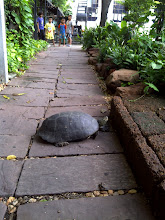As Bobbyseus traveled thus with Penelope and his men-at-arms, their party came upon a wry old man under the shade of a Bodhi tree. The old man, pointed his rheumatic finger at Bobbyseus, saying you are indeed the son of Zeus, wary thou must be to avoid the pitfalls en route to thine kingdom. Bobbyseus, though troubled by the words of the aged man, could afford to pay little heed to his words, thinking of course that such pitfalls meant the presupposed battle with Demophon and Usurpius. Onward the demigod trekked, his woman and warriors following behind as he struck any who attempted to pass him. As they passed field and vale, Bobbyseus began to thirst and called to a nearby field hand. “ Lo! Come and allow me to slake mine thirst with thine drink”. Little did the god-man know that Hades had taken the form of a field hand as part of his dastardly plot. The field hand handed Bobbyseus the amphora of wine saying, “This is indeed strong fermented juice of the grapevine. Much of its fructose hath been converted to ethanol by yeast.” Bobbyseus said nothing and drank the whole hardened clay container in one gulp. To Hades’ surprise the hero still stood before him unaffected. With words unslurred ere the alcohol entered his divine bloodstream, Bobbyseus called for more of it. Hades summoned yet another amphora and then another. Bobbyseus’ power grew with each container, soon he was spewing words of insight about human nature and why mortals sucketh. Then he spaketh of his love for Penelope. Finally he became surly and filled with rage for Hades had run out of amphorae. Hades thought to himself, “Alas my plan has failed! I have given him Athenian Gentleman, the greatest poison in all the land. Perhaps he cannot be felled by such a mortal concoction.” Hades was nothing if not cunning (from the Middle English cunting which in turn yields the modern English c-word), and soon devised a plan B, which reminded him he needed to stop by the agora and pick up some for Persephone. He gave unto Bobbyseus a small vial containing a protein shake of ambrosia and nectar. Bobbyseus in his great wisdom, took the vial without a chaser and then shattered the empty vessel upon the earth in a fit of rage. His work done, Hades headed to the nearest agora and Bobbyseus staggered forward leading his company towards the city of Argos and thereby, his destiny.
Saturday, November 5, 2011
Tuesday, September 20, 2011
The Bobbysiad : The Road Less Taken
“ Όλοι οι δρόμοι οδηγούν στη Θήβα, αλλά μόνο ένας στο θρόνο”
Bobbyseus heeded well the words with which Mentor had parted from this life, taking the road less traveled by towards the city. He carried Penelope upon his back for the fates had decreed that chivalry could not die so long as Bobbyseus lived. On the second day of their trek, the young couple stopped to eat a picnic lunch on the banks of the Brandywine River under the ample shade of a Kauri tree. While lost in each other’s eyes, an all too common phenomenon, a party of ants stole away with their food. Enraged, Bobbyseus hauled off after them, each stride as long as a man’s life. He followed his quarry to a large boulder composed of gneiss, a metamorphic rock. Upon the boulder, in a script that had seen too many winters, was written thus: “Όποιος ανελκυστήρες αυτό το βράχο και ανακτά το δόρυ του Αχιλλέα πρέπει να είναι βασιλιάς, ”. “What that I could but know the meaning of such characters! This script is so ancient that I cannot read it!” exclaimed Penelope. “There are few now who can,” explained Bobbyseus. “It is written in the language of Homer, which by the grace of Athena I can read. It says whosoever lifts this stone and retrieves the spear of Achilles shall assume his mantle.”
“His mantle? Wasn’t Achilles king of Thebes?” questioned Penelope. “I see now why Mentor had me travel via this forgotten road,” spake the half mortal. With that Bobbyseus began to power up. With his knees bent at slightly less than ninety degrees, the massive glutes and quads of the demigod tore rock from earth. A resounding flex of his massive traps and posterior delts flipped the boulder above his head. Now with a grunt yet to be rivaled in the gyms of men, Bobbyseus heaved the boulder into the air. The boulder landed a short distance away splitting in two, an outward manifestation of the dual nature of Bobbyseus. The brazen glint of Achilles’ Spear caught the azure gaze of the demigod. Bobbyseus then bent to retrieve it. Hearing a rustling behind him, he leapt around, wielding the spear with the skill of Achilles after consuming multiple amphorae of sierran dew. To his shock, before him stood hundreds of fully armed warriors, having taken their current form by transforming from ants. Wary, he said unto them, “Though your numbers are many, so are the fibers of both my morals and muscles. If ye are not friend, then you can join my foes in Hades.”
The first warrior came forward, lowering his sword and shield. “We pray that you find us to be the former, son of Zeus. We are Myrmidons, battle companions of Achilles. We were fated to remain as ants upon this earth until the heir of Achilles came forth. We are ready to serve you as we did Achilles.” With that the Myrmidons knelt before Bobbyseus, proclaiming their loyalty. Though taken aback, Bobbyseus now realized that with these warriors at his side, he may well be able to defeat the malevolent forces of Demophon and unseat his uncle Usurpius from the Theban throne.
Monday, September 5, 2011
SM - A Note from Zeus, the Stair Master
Sunday, September 4, 2011
The Bobbysiad: Birth of Bobbyseus
Into this epoch of great deeds came Zeus, Lord of Olympus. He traveled down to the realm of mortality to attend the feast of King Peleus of Thebes. Peleus, who had gained both renown and wealth in many battles, was known for the beauty of his daughter, Xanthippe. A youthful maiden of tender years, her beauty was said to rival that of Aphrodite. As such, Peleus had set his mind to marry her to King Brasidas of Sparta, thereby increasing his prestige. Xanthippe, for her part, wanted nothing to do with the aging tyrant of Sparta and wished only to follow her heart. Thus, when a golden youth appeared at the Feast of Anthesteria, she swooned over the new arrival. King Peleus was wary of this newcomer and attempted to send him away, but Xanthippe reminded him of his duties as host. Thus, Peleus could only watch with dismay as Xanthippe fawned over the youth who not only consumed 4 racks of lamb, but polished off 5 amphorae of the choicest wine. As the Feast was ending, the youth presented a gift to King Peleus. Effervescent with nebulosity, the azure drink contained the essence of Morpheus, God of Dreams. Reluctantly taking the drink from the young man he despised, Peleus soon fell into a deep sleep. With Peleus out of the way, the youth led Xanthippe to the deserted courtyard wherein he revealed his divine nature. What followed could only be described as the Immaculate Failure of Contraception. Zeus’ divine nature came through and he made not just Eros to Xanthippe, but they made sweet Agape. When he was finished, Zeus made a prophecy unto her, “Ye and though I must leave you now, do not fear, for I have given you a child to remember me by. Nurture him well, and when the time is right reveal unto him that he is my son. He will be a child of destiny, whose name will one day ring out to all the ends of the Earth.” With that Zeus departed for Olympus, quickly combing his beard and using LISTERINE®, shouldest Hera suspect his infidelity by lack of product placement. Xanthippe, now exhausted from the virility of his lovemaking, fell into the most peaceful of slumbers.
Now in the days and weeks that followed, Xanthippe realized that she must conceal her embarrassment (from which we get the Latin word embarrasado meaning pregnant) from King Peleus, lest he put her out for harlotry. Soon, however, her swollen womb could no longer remain hidden under loose fitting togas and she was forced to admit her indiscretion before the King. In a tirade for the aegis, Peleus berated her with cries words of “loose woman! Whore! Salty Wench! Harlot! Painted Lady! and Trick!”. In her emotional duress, she began having contractions. In only a moment’s time, a child emerged in an aura of divinity. Peleus, now beside himself with rage, made to end the child’s short life with a knife. The infant, swaddled in the essence of the gods, caught Peleus’ hand and threw him to the ground with the strength of a grown man. The skies now opened up and the wrath of Zeus descended upon Peleus with a thunderbolt. As Peleus collapsed in a smoldering heap of charred flesh, a voice spaketh from the heavens saying, “This is my son, who shall be called Bobbyseus! To those who would oppose him, look to Peleus as a model!” The people of Thebes bowed before Xanthippe and Bobbyseus and paid him homage. Below the Earth, however, the all-pervading silence was broken by the rage of Hades. You see, Hades coveted Xanthippe and was yet again outdone by his brother Zeus. In his fury, he vowed that Bobbyseus would not reside for long in the land of the living. DUN DUN DUNNNN
Tuesday, August 30, 2011
The Bobbysiad: Autolochus Begins The Story
As the fleeting twilight melded into the realm of Selene, the bacchanalian atmosphere faded to demure recollection. The sound of laughter yielded to the strumming of lyres and enough yarns were spun to put Arachne to shame. For one poet, however, only the greatest of tapestries would suffice. “Hand me my lyre, boy, so that it may speak to those gathered here”. As Proteus fetched the gilded lyre of Autolochus of Elea, he tittered with anticipation. Autolochus, though blind to the world of men, could see a story through to its end with the skill of Apollo and the grace of Hermes. Taking his lyre from the boy, Autolochus began strumming. A translucent aura emanated from the instrument binding listener to story, as Prometheus to mountainside. Autolochus began, “It was the best of times, it was the worst of times. Best in that heroes still walked the earth, the opportunity for valor still lying beyond the next hill. Worst too, in that there was a dire need for these heroes. For the world was a more dangerous place than we can now imagine. Monsters and creatures abounded, the likes of which I have never seen.” The crowd sighed, as Autolochus enjoyed drawing attention to his lack of sight at the expense of his audiences’ comfort. “I tell you not of Hercules, of Bellerophon, nor of Theseus, nor Achilles, nay, I tell of a man greater than them all.” The crowd was on edge, knowing exactly of whom Autolochus spake. “I tell you of BOBBYSEUS! son of ZEUS! first among both gods and mortals! And where better to begin….than the Beginning,”.
Subscribe to:
Comments (Atom)

